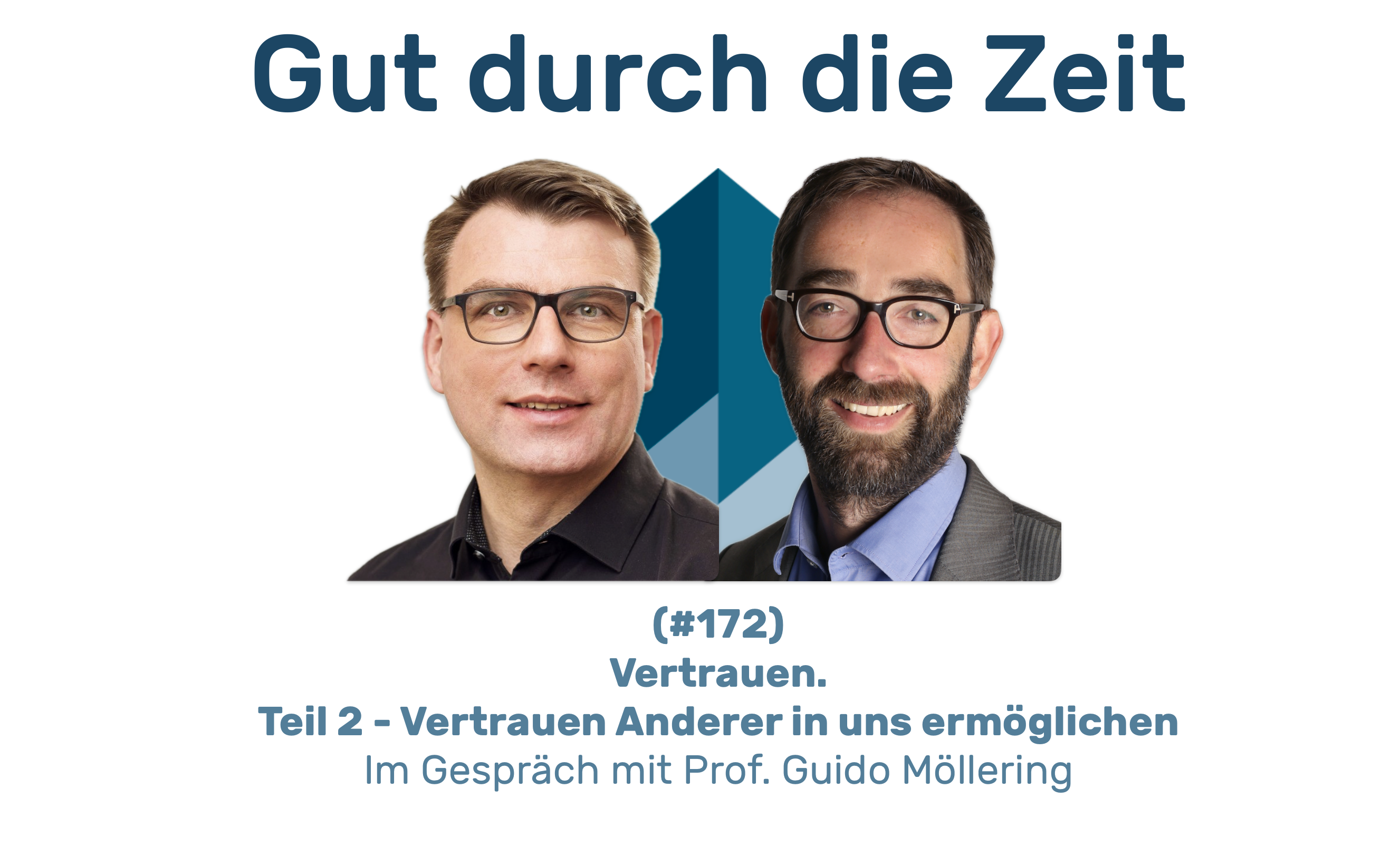INKOVEMA Podcast „Well through time“
#172 GddZ
Trust. Part 2 – Enabling others to trust us.
Trust is not a leap into the fog of uncertainty, but into the arms of others – What can they do to make the leap?
In conversation with Prof Guido Möllering
Well through time. The podcast about mediation, conflict coaching and organisational consulting.
Prof Dr Guido Möllering, who completed his doctorate at the University of Cambridge in 2003 and his habilitation at the Free University of Berlin in 2011, has been Director and Chair of the Reinhard Mohn Institute for Corporate Management (RMI) at Witten/Herdecke University since 2016. Under his leadership, the RMI's areas of specialisation include: Cooperative relationships, network and alliance strategies, management of openness and transparency, trust in and between organisations, new forms of leadership and work in the digital age and corporate responsibility. Guido Möllering has published in leading professional journals and is the author of books including Trust: Reason, Routine, Reflexivity (2006) and Production in networks (with Jörg Sydow, 3rd ed., 2015). In 2009, he received the Peregrinus Foundation Prize from the Bavarian Academy of Sciences and Humanities for his work of significance to business and society. Since 2018, he has been a member of the jury for the corporate responsibility competition "My Good Example".
Contents:
Our second part on the subject of trust deals with the question of what is necessary and can be done to create trust (on the other side) that then proves to be robust.
In the Study by Nikolova/Möllering/Reihlen (2015) three central social practices are emphasised that strengthen trust, especially in the complex and uncertain relationships between clients and advisors:
- Signalling capability and integrityThis practice includes the demonstration of competence and ethical standards by advisors. Clients value consultants who have proven their expertise and reliability through previous successes and behaviour and can now demonstrate it in (new) client communication: This is why testimonials, certificates, testimonials, references etc. have an impact.
- Demonstration of goodwillConsultants must actively demonstrate that they understand the needs and interests of their clients and are committed to meeting them. This includes responding to specific customer needs and adapting the advisory services to the customer's individual expectations. This can be done reactively, i.e. on demand, or proactively.
- Building an emotional connectionThe development of a personal bond between advisor and client, based on mutual understanding and sympathy, is crucial. This emotional connection helps to reinforce the sense of security and personal commitment in the relationship, which in turn strengthens trust and makes it robust.
These practices help to bridge the inherent uncertainty and vulnerability in advisor-client relationships – especially at the beginning – by creating a trusting and stable basis for collaboration.
The process of building trust between clients and advisors
The process of building trust in the relationship between clients and advisors, as described in the study by Nikolova et al. (2015), involves several key components that work together in a dynamic and interactive framework. This process is based on the Basic assumption that trust is not just a mental state, but also a social process that is actively shaped. Here are the main elements of the trust-building process:
1. signalling capability and integrity
This step involves the consultant actively demonstrating competence and reliability. Advisors must demonstrate their skills and ethical standards through past successes, references and professional behaviour. This creates a foundation of trust by showing clients that the advisor is qualified and trustworthy.
2. demonstration of benevolence
Consultants must not only be technically competent, but also show a genuine interest in the specific needs of their customers. This is achieved by providing customised solutions, taking the customer's interests into account and acting proactively. Customers need to feel that advisors understand and prioritise their needs, which is another important element of building trust.
3. building an emotional connection
The third component of the trust-building process is the establishment of an emotional bond between the consultant and the customer. This emotional connection is based on sympathy, personal compatibility and mutual respect. This bond reinforces trust by creating a more personal level of interaction and engagement that goes beyond purely business interactions.
Process nature of trust
The authors emphasise the process nature of trust, which requires continuous interaction and adaptation between advisor and client. Trust is seen as dynamic, meaning that it develops and changes over time and through different phases of the relationship. This process involves the constant assessment and reassessment of trustworthiness based on the experiences made in the course of the collaboration.
Overall, this framework shows that trust in professional relationships is a complex interplay of skills, intentions and emotions that is fostered by social practices. These social practices should not be viewed in isolation, but interact and reinforce each other to build a stable and trusting relationship.





Leave A Comment